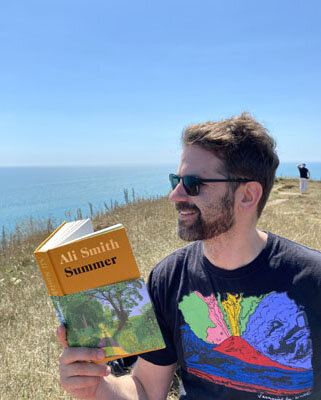What a strange, tumultuous journey it's been over the past four years, but I'm so grateful that I've had Ali Smith's Seasonal novels by my side! Who could have predicted the many unsettling transformations that would take place in our social and political landscape when she began this ambitious writing project back in 2016? The highly contentious Brexit vote described in “Autumn” resulted in the UK officially leaving the EU this year. The conservative ex-mayor of London who was mocked in “Winter” has now become the Prime Minister. Some of the immigrants being detained under the watchful gaze of a correction officer in “Spring” have now been released because of the Covid-19 pandemic. It's so unique how the stories in these novels have been shaped by our immediate times and thus captured the sensibility, fears and divergent opinions of the country in its state of constant flux. As Iris remarks in this novel: “We're all walking the line now, the line between one era and another.” This makes these novels invaluable documents as they reflect this turbulent era. But they also join together to form a tapestry of relationships between specific characters introduced over the course of the previous novels, many of whom reappear in this final book in the series “Summer”.
This novel primarily focuses on the stories of Grace Greenlaw, a single mother and former actress who lives next door to her ex-husband Jeff, as well as their two children Sacha and Robert. As with the other novels, there are multiple conversations and oodles of pleasurable witty dialogue between the characters which results in a lot of humour and fun wordplay. Grace is also visited by Arthur and Charlotte from the novel “Winter” who are continuing their 'Art in Nature' online project. They all go to interview Daniel Gluck from “Autumn”. He's now 104 years old and still being visited by Elisabeth who is reading a novel she describes as “Sub Woolfian” about Rilke and Katherine Mansfield which was referred to in “Spring”. Although there are multiple references to events that occurred as recently as May and June of this year, the novel also looks back to previous seasons and periods of time such as the Hutchinson Internment Camp of WWII, a facility on the Isle of Man where German refugees and English residents with German or Italian heritage were held under suspicion throughout the war.
The way Smith threads pockets of history throughout her novels shows how no period of time stands in isolation from the past. Just as the seasons change in ways that we come to expect so do the machinations of society which alternately supports or suppresses its people. But, while larger events and the victors get their stories cemented in the history books, many of the casualties of these periods and their unrecorded stories are entirely forgotten. Smith's novels give a nobility to their perspectives as they show the opinions of people commenting and reflecting upon the changes occurring around them. Jeff's new younger partner Ashley has been working on an Updated Lexicon to trace the path between how words were initially used and how their meaning has been altered by politics. However, Ashley ominously goes silent.
As with the previous novels, “Summer” also meditates upon the life of a now relatively obscure female artist. In this case, she writes about the life of writer and filmmaker Lorenza Mazzetti. Smith also notes many lost attempts at communication between her characters with postcards, letters and text messages which never reach the intended recipient. Whether we are heard or not, Smith seems to suggest the solution to help guide and support one another is sincere open dialogue which bears witness to what's happening around us. In an exchange between Art and Charlotte it's stated: “I'm phoning because listening and communicating and staying in touch with each other is how we're going to get through this time for sure / Not that this time's going to be over for any of us very soon, she says. I have a feeling this time's here to stay, one way and another.” Though our society goes through cycles there are certain events and changes which permanently affect our lives.












